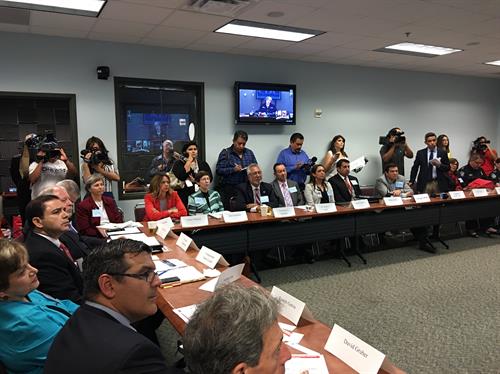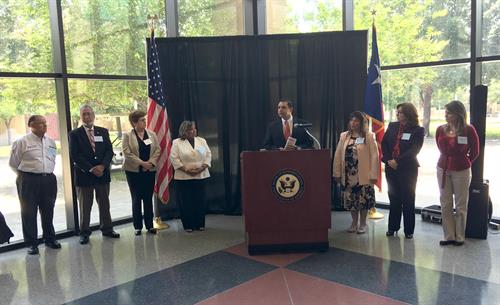Press Release
Rep. Cuellar Hosts International Zika Virus Meeting in LaredoTop health officials discuss spread of Zika Virus Disease across countries
LAREDO, Texas,
April 22, 2016
|
Rafael Benavides
((956) 725-0639)
Congressman Henry Cuellar (D-TX-28) today hosted an international meeting at Texas A&M International University (TAMIU) to discuss the threat of the Zika virus in Texas. The meeting discussed what actions the Centers for Disease Control and Prevention (CDC) and other state, local and international health agencies are taking to prevent further spread of the virus and address how all levels of government can work together in this effort. In attendance were high-ranking officials from the CDC, as well as representatives from the Department of Homeland Security, the State of Texas and the Texas Department of State Health Services, the City of Laredo Health Department, Webb County, Hidalgo County Health and Health Services, Laredo Medical Center, Doctors Hospital of Laredo, el Hospital Centro Médico Nacional de México, the Tamaulipas Secretariat of Health, researchers from la Universidad Autónoma de Tamaulipas, la Universidad Autónoma de Nuevo Leon, la Universidad Autónoma de Coahuila, la Universidad de Monterrey, la Universidad de Tamaulipas, the University of Texas Health Science Center at San Antonio, Texas A&M International University, and Laredo Community College. “The Zika virus disease is a reminder of how we must stay vigilant against biological and physical threats at our borders,” said Congressman Henry Cuellar. “While the news seems alarming, no cases have been reported in South Texas. However, it is concerning because of the rapid spread of the disease and the birth defects it causes in pregnant women. This is why I took the preemptive approach in inviting top health agencies from the United States, Mexico and Texas to the border today to discuss what we are all doing to prevent further spread of this disease. The well-being and health of our citizens is a top priority we all share” “We are learning more about Zika and the impact it can have on pregnancy every day,” said Anne Schuchat, MD, CDC Principal Deputy Director. “CDC is committed to working with state and local health officials, clinicians, and families to protect pregnant women from the devastating impact this virus can have.” About the Zika virus In May 2015, the Pan American Health Organization (PAHO) issued an alert regarding the first confirmed Zika virus infections in Brazil and outbreaks have quickly spread since then to many countries. Most outbreaks have been confined to countries in South America, Central America, Mexico and the Caribbean. According to the CDC, local mosquito-borne transmission of Zika virus has been reported in the Commonwealth of Puerto Rico, the US Virgin Islands, and American Samoa, yet no local mosquito-borne Zika virus disease cases have been reported in U.S. states. However, there have been at least 358 confirmed travel-associated cases of Zika in 40 U.S. states and the District of Columbia, with 27 cases in Texas. No cases have been reported in Webb County or the Texas border zone, according to the Texas Department of Health and Human Services.
|



